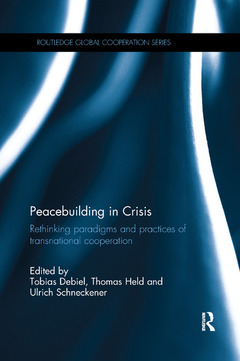Peacebuilding in Crisis Rethinking Paradigms and Practices of Transnational Cooperation Routledge Global Cooperation Series
Coordonnateurs : Debiel Tobias, Held Thomas, Schneckener Ulrich

The 1990s saw a constant increase in international peace missions, predominantly led by the United Nations, whose mandates were more and more extended to implement societal and political transformations in post-conflict societies. However, in many cases these missions did not meet the high expectations and did not acquire a sufficient legitimacy on the local level. Written by leading experts in the field, this edited volume brings together ?liberal? and ?post-liberal? approaches to peacebuilding. Besides challenging dominant peacebuilding paradigms, the book scrutinizes how far key concepts of post-liberal peacebuilding offer sound categories and new perspectives to reframe peacebuilding research. It thus moves beyond the ?liberal???post-liberal? divide and systematically integrates further perspectives, paving the way for a new era in peacebuilding research which is theory-guided, but also substantiated in the empirical analysis of peacebuilding practices.
This book will be essential reading for postgraduate students and scholar-practitioners working in the field of peacebuilding. By embedding the subject area into different research perspectives, the book will also be relevant for scholars who come from related backgrounds, such as democracy promotion, transitional justice, statebuilding, conflict and development research and international relations in general.
1. Peacebuilding in Crisis? Debating peacebuilding paradigms and practicesPart 1 Reflecting Peacebuilding Paradigms 2. Peacebuilding and Paternalism 3.The Future of Peacebuilding4. Relational Peacebuilding: Promise beyond crisisPart 2 Revisiting Peacebuilding Practices 5. Peacebuilding and Democracy Promotion: What current challenges to the latter might tell us for rethinking the former 6. Adapted instead of Imported: Peacebuilding by power-sharing7. Transitional Justice and Reconciliation in Research and Practice: Achievements and shortcomings8. Truth Commissions, Human Rights and Gender: Normative changes in transitional moments 9. Reforming the Security Sector and Rule of Law: The hidden transcripts of local resistance 10. Corporate Peace: Crisis in economic peacebuilding Part 3 Rethinking Promises and Pitfalls of ‘the Local’ 11. What do we mean when we use the term ‘local’? Imagining and framing the local and the international in relation to peace and order12. Understanding the "local" in Peacebuilding: Conceptual discourses and empirical realities 13. False Promise: ‘Local ownership’ and the denial of self-government 14. Rethinking the Local in Peacebuilding: Moving away from the liberal/post-liberal divide
Tobias Debiel is Professor for International Relations and Development Policy, at the University of Duisburg-Essen, where he is the Director of the Institute for Development and Peace as well as Director of the Käte Hamburger Kolleg/Centre for Global Cooperation Research, Germany.
Thomas Held is the Managing Director, German Foundation for Peace Research (DSF) which was founded in 2000 to strengthen peace research in Germany.
Ulrich Schneckener is Professor of International Relations and Peace & Conflict Studies,University of Osnabrück, and Director of the University’s Center for Democracy and Peace Research as well as Member of the Governing Board of the German Foundation for Peace Research, Germany.
Date de parution : 01-2018
15.6x23.4 cm
Disponible chez l'éditeur (délai d'approvisionnement : 14 jours).
Prix indicatif 56,31 €
Ajouter au panierDate de parution : 02-2016
15.6x23.4 cm
Disponible chez l'éditeur (délai d'approvisionnement : 14 jours).
Prix indicatif 178,41 €
Ajouter au panierThèmes de Peacebuilding in Crisis :
Mots-clés :
Liberal Peace Agents; BiH; Africa; Socioeconomic Development; Asia; East Timor; Middle East; Liberal Peacebuilding; conflict resolution; Liberal Peace; democracy; International Peacebuilding; democratisation; Civil Society; future; Local Turn; gender; Hybrid Political Orders; liberal; Liberal Peace Paradigm; political economy; Peacebuilding Interventions; social anthropology; Peacebuilding Research; transitional justice; Peacebuilding Practices; war; Ulrich Schneckener; Hybrid Peace; Michael Barnett; International Peacebuilding Missions; David Chandler; Democracy Promotion; Morgan Brigg; South Sudan; Jonas Wolff; Truth Commissions; Andreas Mehler; International Local Divide; Martina Fischer; Transitional Justice Mechanisms; Susanne Buckley-Zistel; External Peacebuilders; Keith Krause; Thick Relationality; Michael Pugh; Thin Relationality; Roger Mac Ginty; Thania Paffenholz; Pol Bargués-Pedreny; Patricia Rinck



